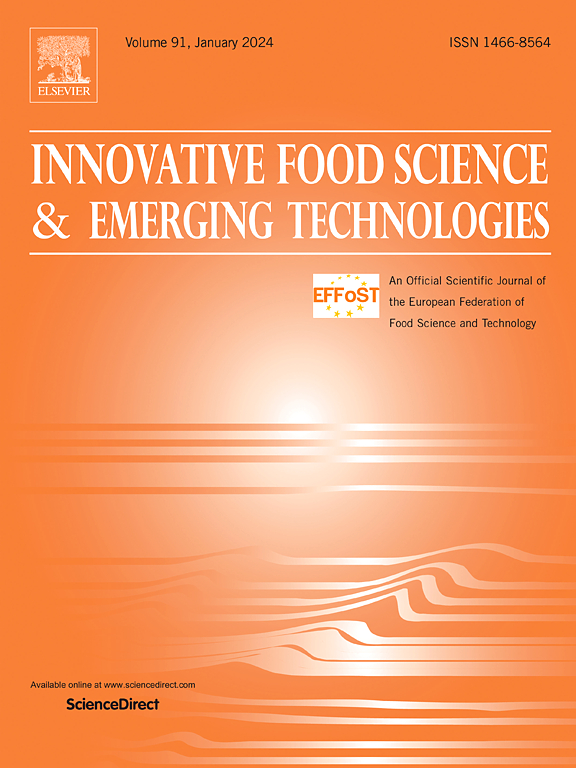室温下 150-250 兆帕高压灭活 Alicyclobacillus acidoterrestris 孢子以及创新技术预处理的效果
IF 6.8
1区 农林科学
Q1 FOOD SCIENCE & TECHNOLOGY
Innovative Food Science & Emerging Technologies
Pub Date : 2024-11-06
DOI:10.1016/j.ifset.2024.103861
引用次数: 0
摘要
本研究评估了在 150、200 和 250 兆帕的高压灭活(HI)条件下长达 24 小时(环境温度为 18-23 °C)灭活苹果汁中的酸根尖螺旋体(ACB)孢子的效果。在进行 HI 处理之前,评估了热巴氏杀菌(90 °C,30 秒)、高压处理(600 兆帕,3 分钟,HPP)、脉冲电场(30 千伏,80 微秒,1400 赫兹,PEF)和超声波(67 瓦,20 千赫,5 分钟,US)等预处理对孢子的影响。结果被拟合到非线性灭活动力学模型中,包括双相模型、对数逻辑模型和威布尔模型。无论压力水平如何(初始载量约为 6 log CFU/mL),在未进行预处理的情况下,HI 24 小时后可减少 ACB 孢子≈4.56 log 单位。除了 PEF 的灭活率较低(加压 24 小时后灭活率≈3.5 对数单位)外,其他预处理对 HI 期间的 ACB 孢子没有影响(加压 24 小时后灭活率≈4-5 对数单位)。相衬显微镜显示,孢子在 HI 期间无法形成无性细胞。这项工作的结果表明,在传统热巴氏杀菌和其他非热技术(HPP、PEF 和 US)处理苹果汁之前或之后使用 HI,可在室温和冷藏条件下灭活 ACB 孢子。鉴于 ACB 孢子的高热稳定性及其工业相关性,应进一步研究这种方法。本文章由计算机程序翻译,如有差异,请以英文原文为准。
Hyperbaric inactivation at 150–250 MPa of Alicyclobacillus acidoterrestris spores at room temperature and effect of innovative technologies pre-treatments
This study evaluated hyperbaric inactivation (HI) at 150, 200 and 250 MPa, up to 24 h (at ambient temperatures,18–23 °C) to inactivate Alicyclobacillus acidoterrestris (ACB) spores in apple juice. The effects of pre-treatments on spores by thermal pasteurization (90 °C, 30 s), high pressure processing (600 MPa, 3 min, HPP), pulsed electric field (30 kV, 80 μs, 1400 Hz, PEF), and ultrasound (67 W, 20 kHz, 5 min, US) prior to HI was evaluated. The results were fitted to non-linear inactivation kinetic models, including Biphasic, Log-logistic, and Weibull. Without a previous pre-treatment, ACB spores were reduced ≈4.56 log units by HI after 24 h, regardless of the pressure level (initial load around 6 log CFU/mL). The pre-treatments did not affect ACB spores during HI (≈4–5 log units' inactivation after 24 h under pressure), except for PEF that resulted in a lower inactivation (≈3.5 log units after 24 h under pressure). Phase contrast microscopy revealed that the spores were unable to form a vegetative cell during HI. HI at 5 °C resulted in a lower inactivation level, with 3.86, 2.54 and 1.77 log units of inactivation, respectively, at 150, 200 and 250 MPa after 96 h.
Industrial relevance
The results of this work point to the possibility of using HI, before or after conventional thermal pasteurization and other nonthermal technologies (HPP, PEF, and US) to process apple juice, to inactivate ACB spores at room temperature and also under refrigeration. This methodology should be further studied in the context of ACB spores' high thermal stability and its industrial relevance.
求助全文
通过发布文献求助,成功后即可免费获取论文全文。
去求助
来源期刊
CiteScore
12.00
自引率
6.10%
发文量
259
审稿时长
25 days
期刊介绍:
Innovative Food Science and Emerging Technologies (IFSET) aims to provide the highest quality original contributions and few, mainly upon invitation, reviews on and highly innovative developments in food science and emerging food process technologies. The significance of the results either for the science community or for industrial R&D groups must be specified. Papers submitted must be of highest scientific quality and only those advancing current scientific knowledge and understanding or with technical relevance will be considered.

 求助内容:
求助内容: 应助结果提醒方式:
应助结果提醒方式:


